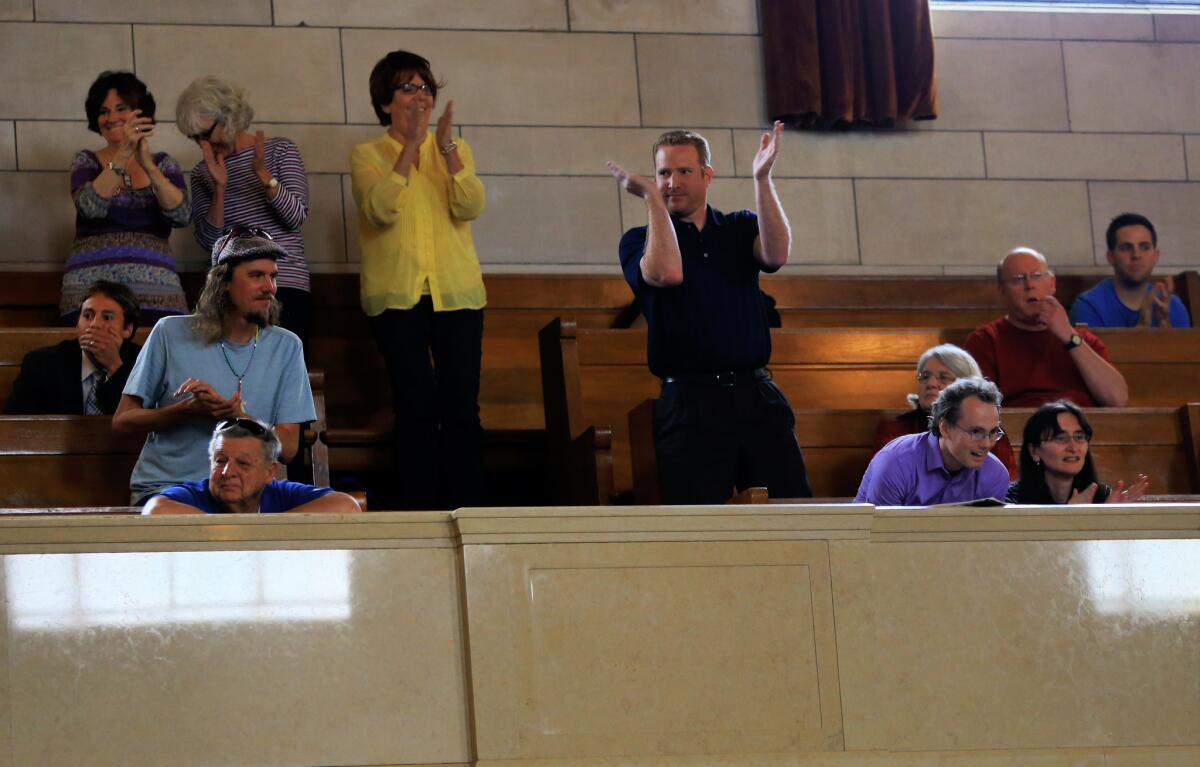Opinion: The (hopefully) wobbly state of the death penalty

Spectators applaud the Nebraska Legislature’s override of Gov. Pete Ricketts’ veto of a death-penalty repeal bill. The vote makes Nebraska the first traditionally conservative state to ban capital punishment since North Dakota in 1973.
- Share via
Let’s take a count, shall we?
With the state Legislature’s razor-thin rejection of Gov. Pete Ricketts’ veto Wednesday, Nebraska became the 19th state to formally abolish the death penalty -- and the seventh in the last decade. Others have come close. A single vote in a Delaware legislative committee derailed an abolition effort there earlier this month. Supporters say they will continue to push the measure, which has the backing of that state’s governor, Jack Markell, a former supporter of the death penalty who recently described it as an “instrument of imperfect justice.” Legislators in Montana, Kansas, Arkansas and elsewhere have gained traction on death penalty repeal bills as well.
But the nation is shifting away from capital punishment in other ways, too. Governors in four states -- Colorado, Oregon, Pennsylvania and Washington -- have declared a moratorium on executions, citing doubts about the process. Six states with the death penalty on the books haven’t carried out an execution in more than a decade. Problems with lethal injections -- from legal challenges to an inability to procure the drugs -- have halted executions in at least 15 more states, and the U.S. Supreme Court is considering the constitutionality of a protocol using midazolam.
In fact, since January 2014, five states -- Texas, Missouri, Florida, Oklahoma and Georgia -- have conducted all but two of the nation’s executions. Over at Time, journalist David Von Drehle, who has covered the death penalty for nearly 30 years, writes this week that he thinks the atrocious system is on its way out. And part of the shift, as I mentioned last week, is notable because more conservative Republicans are backing repeal based on its expense and ineffectiveness.
It can’t happen soon enough. Beyond the immorality of executions, the system is irredeemably flawed. The Death Penalty Information Center reported that through the end of 2013, 15 counties accounted for 30% of executions since the practice resumed in 1976. Yet those 15 counties “represent less than 1% of the total number of counties in the country, and less than 1% of the total number of counties in states with the death penalty.”
So beyond disparities in application of the death penalty based on race and class (the wealthy can afford better legal representation than the poor), there are disparities in geography. Each state sets its own policy on capital punishment, but even within states there are wide differences in death sentences by county. Some of that can be attributed to differences in population, and in homicide rates, but not all. For example, the Death Penalty Information Center’s report found that Los Angeles, Orange and Riverside counties account for more than half the people on the state’s death row, but only 39% of the state’s population. And they account for only 40% of the state’s homicides (2000-13), according to state Department of Justice statistics.
The decision on whether to seek the death penalty often comes down to individual prosecutors, which puts an inordinate amount of power in the hands of one person, further exacerbating the arbitrariness of the system. And the race of the victim plays a big role. According to the most recent death row report by the NAACP’s Legal Defense Fund, in cases that have led to all 1,394 executions from 1976 to this past January, 76% of the victims were white and 35% of those executed were black. Yet federal homicide statistics show that more than half the nation’s homicide victims are black. As the Equal Justice Initiative points out:
“More than half of the 3,095 people on death row nationwide are people of color; 42% are African American. Prominent researchers have demonstrated that a defendant is more likely to get the death penalty if the victim is white than if the victim is black. The key decision makers in death penalty cases across the country are almost exclusively white. Despite decades of evidence showing that the administration of the death penalty is permeated with racial bias, courts and legislatures’ refusal to address race in any comprehensive way reveals a fundamental flaw in America’s justice system.”
So it’s a government program that wastes tax dollars, often results in wrongful convictions, doesn’t achieve the intended goals (deterrence and justice), is so arbitrarily invoked that it violates the U.S. Constitution and ultimately degrades human life. No wonder more conservatives are coming around to supporting its repeal, even as an analysis of recent polling shows the oft-cited support among Americans in general is not as strong as it might seem, especially when those surveyed are asked if they prefer the death penalty over life without parole.
Maybe Von Drehle is right and the end is nigh. If so, then the U.S. would remove itself from the uncomfortable companionship of other capital punishment countries like Iran and China, and align itself with Europe and most of the rest of the industrialized world.
Ultimately, it’s hard to try to persuade the world to follow our moral lead on human rights issues when we fail so badly on this one.
Follow Scott Martelle on Twitter @smartelle.
More to Read
A cure for the common opinion
Get thought-provoking perspectives with our weekly newsletter.
You may occasionally receive promotional content from the Los Angeles Times.











